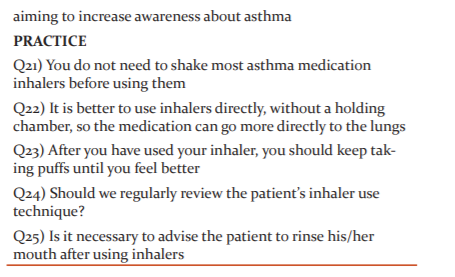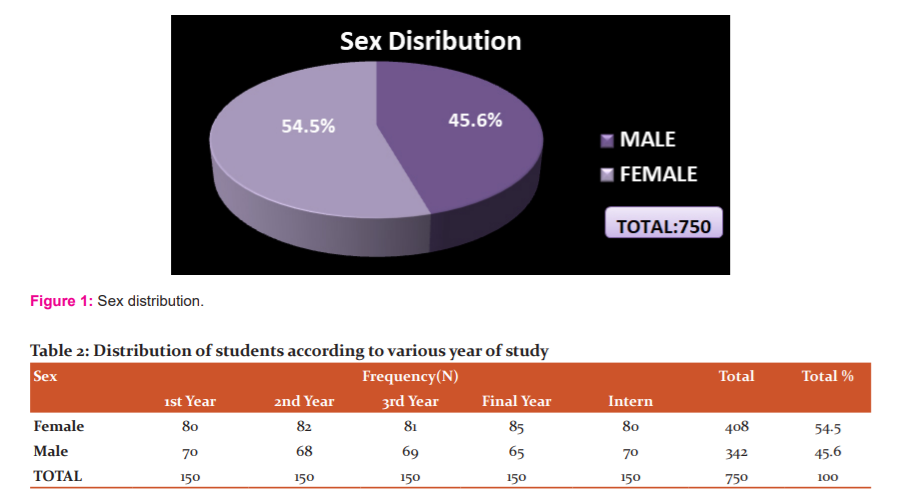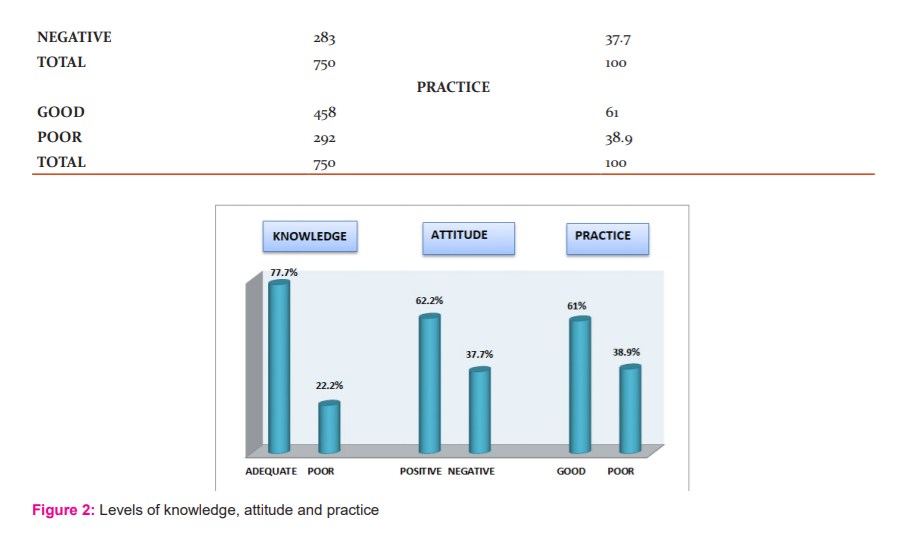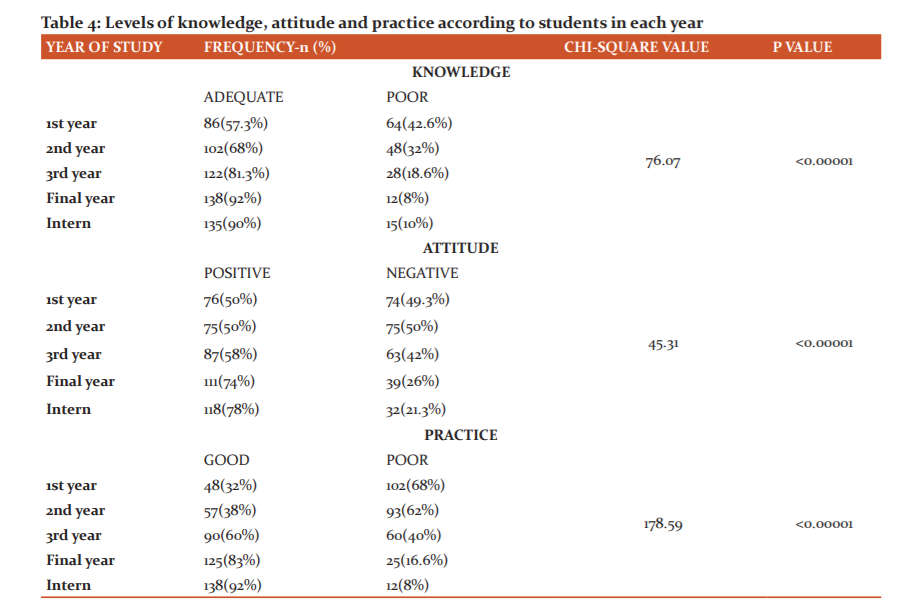IJCRR - 13(6), March, 2021
Pages: 129-134
Date of Publication: 20-Mar-2021
Print Article
Download XML Download PDF
Assessment of Knowledge, Attitude and Practice of Bronchial Asthma Among Medical Students - A Questionnaire Based Study
Author: Kavya A, Joy P
Category: Healthcare
Abstract:Introduction: Bronchial asthma is a chronic inflammatory airway hyper-responsiveness which can occur at any age. It is a serious health problem worldwide with a prevalence anticipated to be approximately 4.5 percent. There are more than 339 mil�lion asthma patients across the world including all age groups. In India, the burden of the disease is estimated at more than 15 million patients. Though asthma can't be completely cured, clinical episodes can be prevented and controlled to a greater extent through proper management. But insufficient knowledge of asthma has led to inadequate disease management which has resulted in increased morbidity. Objective: To assess the knowledge, attitude and practice of bronchial asthma among medical students. Methods: A questionnaire based study was conducted in our Institute for a period of 3 months. The data was collected by ad�ministering questionnaire comprising of knowledge, attitude and practice towards bronchial asthma to all medical students in our institute. Results: 93.3% students had known about the disease.85.3% of participants knew about the symptoms of the disease while only 46% knew about the diagnosis using spirometry. 63.4% knew about the medication used and around 83.7% knew about the best route of administration.77.5% had adequate knowledge.62.2% and 61% showed positive attitude and good practice respectively. Conclusion: Successful outcome towards asthma management relies upon many factors like adequate education, positive at�titude and good practice towards the disease. Our study concludes that knowledge, attitude and practice towards the disease increases through each year of medical course.
Keywords: Attitude, Bronchial asthma, Knowledge, Medical students, Practice
Full Text:
INTRODUCTION
The World Health Organisation (WHO) recognizes bronchial asthma as a major health problem. Bronchial asthma is a heterogeneous pulmonary disorder characterized by recurrent episodes of breathlessness, cough, wheezing and bronchial hyper-responsiveness which usually vary in frequency and severity from person to person. In affected individuals, symptoms may occur several times in a day or week, and become worse for some people during physical activity or at night.1,2 It is estimated that more than 339 million people suffer due to bronchial asthma globally.3 Usually, children and young adults are commonly affected age group but it can occur at any age.4 Bronchial asthma is often left under-diagnosed and under-treated and it creates considerable burden to both patients and their families.5
Proper management of bronchial asthma requires both adequate knowledge of the disease and its treatment. The treatment regimen will fail with a lack of knowledge because the patient is unaware of appropriate steps of management and how to avoid triggers as medications are not the only way to control asthma it is also necessary to avoid the triggers. Health professionals play a pivotal role in empowering patients with the necessary skills and knowledge to manage bronchial asthma.6,7 The aim of asthma management is to control symptoms effectively and prevent future exacerbations.8,9 There is a global problem with the management of bronchial asthma either under ignorance in treatment or lack of knowledge about the disease in patients. An average asthmatic patient is generally benighted about his illness and has misbelieved, which needs to be corrected.10
As future health professionals, medical students must acquire adequate knowledge of bronchial asthma before completing their medical school so that he/she can bring out better understanding about the disease on the patient which can change patient’s knowledge and attitude towards the treatment of disease and improve the medication adherence and eventually the therapeutic outcome. The present study is aimed to assess the knowledge, attitude and practice of bronchial asthma among medical students.
MATERIAL AND METHODS
Study design
This is a prospective, observational, questionnaire-based study
Study Area and Population
The study was conducted at Saveetha Medical College, Thandalam, Chennai. There are a totally of 750 medical students in our institute each year comprising of 150 students. All the 750 medical students were included in this study.
Sample size
The sample consisted of 750 medical students
Study period
The study was carried out for a period of 3 months between January 2020 to March 2020
Study tool and data collection method
A semi-structured questionnaire was used as the study tool for data collection. Data collection was done through online Google-forms. The questionnaire consisted of details regarding name, age, sex, year of study and a total of 25 questions in which the first 15 questions reflected the knowledge about the disease, the next 5 questions regarding the attitude towards the disease and the last 5 were related to practice on bronchial asthma among the study participants. The students were expected to respond to the questionnaire within 15 minutes without using any reference material
Statistical analysis
Data entry was done and analyzed using Microsoft Excel 2007. The descriptive statistics were calculated and presented in frequency tables and graphs. The categorical variables were compared using the Chi-square test and P<0.05 were considered statistically significant.
RESULTS
This was a questionnaire based study conducted at Saveetha Medical College, Thandalam, Chennai over 3 months between January 2020 to March 2020. A total of 750 students participated in this study with 408(54.5%) female and 342(45.6%) male students as shown in Figure 1. The participants aged between 18-24 years with a mean age of 21years.
According to our study as shown in Table 2, almost 93.3% of students had known about the disease.90.5% were aware that it is not a communicable disease but only half 53.3% agreed that it can be hereditary. Around 85.3% of participants knew about the symptoms of the disease. When questioned about the triggers 90.8% knew that it can be due to changes in the environment while 79.8% agreed due to direct or indirect cigarette smoke exposure. Only 46% knew that the diagnosis can be made with spirometry. More than half of the study population i.e. 63.4% knew about the medication used while 83.7% knew about the best route of administration. The scoring range of the questionnaire regarding knowledge of the disease was 15 (maximum) to 0 (minimum) with a score of 1 for correct answers and 0 for wrong answers. A cut off level of ≥ 7 was considered as adequate knowledge and <7 as poor knowledge. Knowledge scores for each student were calculated and summed up to give the total knowledge score. As shown in Figure 2 out of 750 around 583(77.7%) showed adequate knowledge and 167(22.2%) showed poor knowledge.
As shown in Table 3, the Question regarding attitude towards the disease was assessed by asking 5 questions as shown in the questionnaire. Around 39.3% said that asthmatic patients should avoid physical activities. While 62.2% agreed that asthma can be prevented with avoidance of certain foods and 54.2% answered as frequent use of antibiotics is necessary during an asthma attack. While assessing the attitude regarding the education of acute asthma attacks 90.4% agreed that patient should be educated regarding acute asthma attacks and 86.1% of the study population agreed that awareness about the disease should be created in schools.
A score of 1 was given for positive attitude and 0 for negative attitude with a score range of 5(maximum) to 0(minimum). The scale classified attitude as positive with a score ≥ of 3 and negative with a score <3. According to our study as shown in Figure 2 more than half i.e. 467(62.2%) showed a positive attitude and 283(37.7%) showed a negative attitude
The practice question was based on inhaler techniques. As shown in table 4, Practice was assessed through 5 questions as shown in the questionnaire.61.8% agreed that asthma inhalers must be shaken before use. 83.3% were aware that the patient’s inhaler technique has to be reviewed regularly and 69.8% admitted it is necessary to counsel them to rinse their mouth after using it. A score of 1 for good and 0 for poor practice with a score range of 5(maximum) to 0(minimum). The scale classified practice as good with a score ≥ of 3 and poor < 3. Out of 750 students, 458(61%) showed good practice and 292(38.9%) showed poor practice towards the disease as shown in Figure 2. Comparing the level of knowledge, attitude and practice with students in each year was found to be statistically significant (Table 4).
As judged by our questionnaire as shown in Table 1, knowledge, attitude and practice increased over each year of the medical course. Results of the study as shown in table 3 revealed that almost 92% of final year students had adequate knowledge followed by interns with 90%. Among the interns, 78% showed a positive attitude and almost 92% showed good practice. This suggests that interns have a better attitude and practice compared to other year students.



In this study, 93.3% of students knew about the disease which was comparable to the study done by Maria Ayub et al.11 where 95% of the study population knew about the disease. While a study conducted by Aparna Gulvadi et al and Bhagavatheeswaran et al.12 showed 64.3% and 61% of the study population respectively which was lower than our study as they have conducted among parents of asthmatic children. This shows that knowledge of bronchial asthma varies among the various study population. This was supported by a study done by Gajanan et al showing that parents of asthmatic children still lack adequate knowledge about bronchial asthma.
DISCUSSION
As per our study, 85.3% of the study population had an understanding of symptoms of asthma which was comparable to the study by Maria Ayub et al. which showed 88% of the study population was aware of the symptoms. Around 84.9% knew that asthma severity varies from time to time. While a study conducted by Moyeta Bariso Gare et al.13 showed only 62.9% as it was among asthmatic patients who belong to various educational background.
90.5% of students in our study knew that the disease is non-communicable which was comparable with the study done by Aherkar RY et al.14 which showed 97.3%. According to a study by Aparna Gulvadi et al., only 77% knew that disease is non-communicable as it was done among parents of asthmatic children. According to our study, 90.8% of the study population was aware that asthma triggers due to environmental factors which were similar to the study by Quah et al.15 which showed 88.6%. While considering whether smoking can induce asthma 79.8% of our study population agreed. A study by Maria Ayub et al. and Bhagavatheeswaran et al showed 93% and 85% respectively.6,7
In this study, 65.2% agreed that asthma severity can be measured with a peak flow meter while a study by Niazi et al.16 showed only 31.5%. 63.4% of the study population knew that the most effective medications used for controlling asthma are steroids and it was only 46.2% according to the study by Moyeta Bariso Gare et al. Regarding the route of administration 83.7% of our study population knew about the best route of drug administration while 52.2% were aware in a study by Niazi et al. These disparities can be attributed to the fact that our study was done among medical students.8
Regarding the attitude towards the disease, 62.2% of the study population showed a positive attitude but a study by Amorha et al17 showed only 49.5%. This might be because their study was done among pharmacy students. Only 47.6% of our population agreed that asthmatic patients can perform the physical activity while a study by Bhagavatheeswaran et al showed 62% as their sample size was very less when compared to our study thus showing a higher percentage.
Among our study population, 62.2% agreed that certain food items can act as asthmatic triggers. This was comparable to a study done by Aparna gulvadi et al. which showed 62.6%. Comparatively a study by Moyeta Bariso Gare et al. and Al-Hardi et al.18 showed 20.5% and 27.5% respectively. It was lesser in these studies as these studies were conducted among the general population.9,15,16
According to a study by AL-hardi et al., only 59.2% of their study population were aware that frequent use of antibiotics does not diminish asthma complications while in our study it was 45.8%. As per our study, 86.1% agreed that awareness about the disease should be increased at schools through educative programs. This was similar to the study by Al-Hardi et al. which showed 90.6%. 10,11
Under the practice, around 61% of our study population showed good practice towards the disease which was comparable to the study by Al-Ali et al.19 showing 56.2%. When questioned about whether asthma inhalers must be shaken well before usage 61.8% of the students agreed as per our study 60% and 58.9% of the study population agreed in the study done by Muniz et al.20 and Al-Ali et al.12-14
According to a study by Al-Ali et al. 65.2% of the study, population stated that their inhaler techniques were checked by the healthcare providers and 83.3% of the study population in this study knew that it is important to review patient’s inhaler technique regularly. As our study was among medical students.17,18 69.8% in our study agreed that it is necessary to advise patients to rinse their mouth after using inhalers and study by Aherkar RY et al. showed 75.4% as their study was done among second-year medicals students with only as their sample size which was lesser than our study.19,20 This study shows that the knowledge, attitude and practice towards the disease increased through the medical course and similar results were shown in Quah et al.
CONCLUSION
Successful asthma management relies on many factors like adequate education, a positive attitude and good practice towards the disease. So, patients education has a greater influence towards better prognosis of the disease therefore the physician plays a major role in not only providing adequate information about the disease but also in altering patients behaviour and practise towards disease management. International asthma guidelines state that a healthy alliance between the patient with asthma (or the parent/caretaker) and the healthcare professional is required for effective management of the disease. So as future healthcare professionals medical students also play a crucial role as adequate knowledge, good attitude and practice can help in better diagnosis and management of the disease. Thus they can provide appropriate information to the patients. As it is the responsibility of the doctor’s to teach them with patience, perseverance, confidence and help them lead a good quality of life.
SOURCE OF FUNDING: None
ACKNOWLEDGEMENT: The authors acknowledge the immense help received from the scholars whose articles are cited and included in references to this manuscript. The authors are also grateful to authors/editors/publishers of all those articles, journals and books from where the literature for this article has been reviewed and discussed.
CONFLICT OF INTEREST: None.




References:
[1] World Health Organization.Asthma.2020.Available at: https://www.who.int/news-room/fact-sheets/detail/asthma. Accessed: 20 June 2020
[2] Behera D, Sehgal IS. Bronchial asthma-Issues for the developing world. Ind J Med Res 2015;141(4):380.
[3] GBD 2016 Disease and Injury Incidence and Prevalence Collaborators. Regional, and national incidence, prevalence, and years lived with disability for 328 diseases and injuries for 195 countries, 1990-2016: a systematic analysis for the Global Burden of Disease Study 2016. Lancet 2017;390(10100):1211-1259.
[4] Prakruthi GM, Bharathi DR, Yogananda R. A case-control study on determinants of childhood asthma in school children of Chitradurga city. Int J Curr Pharm Res 2018;10:11–15
[5] Aparna G, Sreenivasan VK. A clinical study of knowledge, attitude and practices regarding asthma among the parents of asthmatic children. Int J Med Health 2019-5(8):119-123
[6] Gajanan G, Padbidri VS, Chaudhury A. Assessment of knowledge and attitude of parents towards the allergy and bronchial asthma in their children. Int J Med Pub Health2016;6(3):231.
[7] Franks T J, Burton DL, Simpson M D. Patient medication knowledge and adherence to asthma pharmacotherapy: a pilot study in rural Australia. Therapy Clin Risk Manag 2005;1(1):33-38
[8] Global Initiative for Asthma. GINA. 2018. Available at: https://ginasthma.org/gina-reports/. Accessed: September 2020.
[9] McCracken JL. Diagnosis and management of asthma in adults: A review. J Aca Med Assoc 2017;318(3):279-290.
[10] Gibson PG, Wilson AJ. The use of continuous quality improvement methods to implement practice guidelines in asthma. J Qual Clin Pract 1996;16(2):87-102.
[11] Maria Ayub, Shahtaj Ahmed, Zubaria Mursaleen, Shamsa Ashfaq, Zunaira abid, Noor Sab. Assessment of knowledge, awareness and practice of asthma disease among medical students. Res J Bri Phy Sci 2016:2(4):143-145
[12] Bhagavatheeswaran KS, Kasav JB, Singh AK, Mohan SK, Joshi A. Asthma-related knowledge, attitudes, practices (KAP) of parents of children with bronchial asthma: A hospital-based study. Ann Trop Med Pub Health 2016;9(1):23.
[13] Gare MB, Godana GH, Zewdu B. Knowledge, Attitude, and Practice Assessment of Adult Asthmatic Patients towards Pharmacotherapy of Asthma at Jimma University Specialized Hospital. EC Pulmonol Resp Med 2020;9(2):01-10.
[14] Aherkar RY, Bhamare CG, Ghongane BB, Deshpande PK. Assessment of Medical Student’s Knowledge on Metered Dose Inhaler Technique and Asthma in a Tertiary Care Teaching Hospital. Asi Pac J Alle Imm 1997;15(4):135-137.
[15] Quah BS. Knowledge of childhood asthma among medical students. Asi Pac J Alle Imm 1997;15(4):1065-1067.
[16] Niazi SM. Knowledge of Medical students towards Childhood Asthma. J Pharm Sci Res 2018;10(8):2034-2036.
[17] Al-Harbi S, Al-Harbi AS, Al-Khorayyef A, Al-Qwaiee M, Al-Shamarani A, Al-Aslani W, Kamfar H, Felemban O, Barzanji M, Al-Harbi N, Dhabab R. Awareness regarding childhood asthma in Saudi Arabia. Ann Thor Med 2016;11(1):60.
[18] Al-Ali LA, Al Jasmi SA, Al Yammahi LM, Syeed A, Darwish EA. Parental knowledge, attitudes, and practices regarding the use of prescribed inhalers in asthmatic children attending Ambulatory Healthcare Services Clinics. Ibn J Med Biomed Sci 2019;11(2):68.
[19] Muniz JB, Padovani CR, Godoy I. Inhaled medication for asthma management: evaluation of how asthma patients, medical students, and doctors use the different devices. J Pneumo 2003;29(2):75-81.
|






 This work is licensed under a Creative Commons Attribution-NonCommercial 4.0 International License
This work is licensed under a Creative Commons Attribution-NonCommercial 4.0 International License